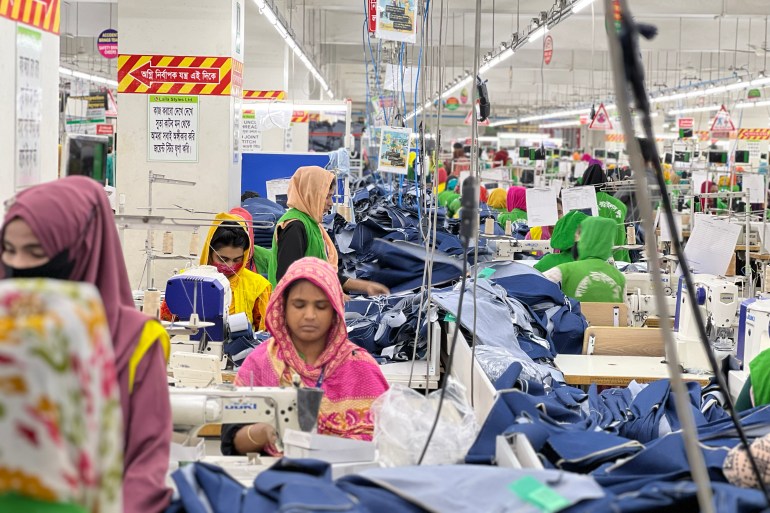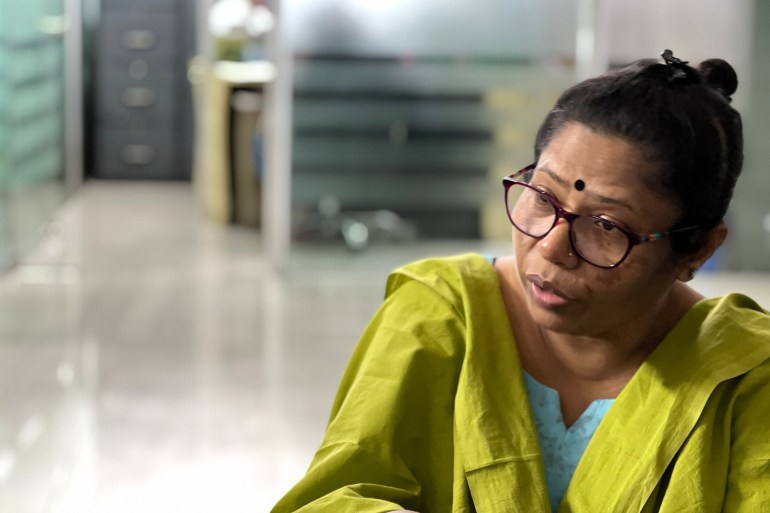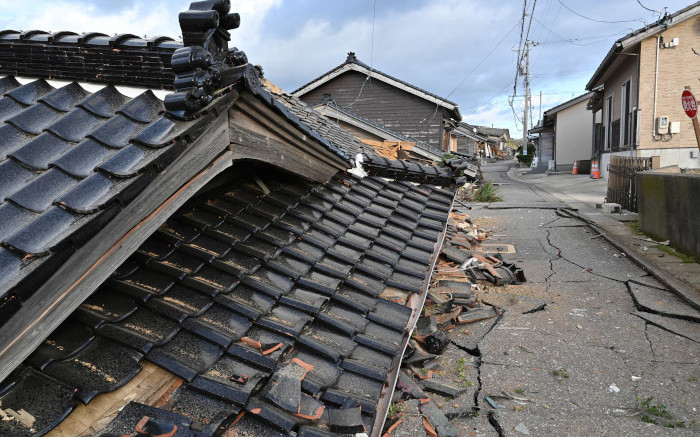
Dhaka, Bangladesh – Weeks after turbulent protests over wage hikes and subsequent factory closures, Bangladesh’s ready-made garments (RMG) industry, a key source of the country’s income, is facing a new phase of fear: “possible” economic sanctions by the country’s Western partners.
The United States and the European Union together account for more than 80 percent of Bangladesh’s multi-billion dollar garment sales, and any sanction against the RMG industry would inflict severe damage on its already struggling economy, analysts said.
The threat of sanctions from the US came as Dhaka announced national elections on January 7, in what is expected to be another seemingly one-sided vote.
These concerns were heightened in early December when a key apparel supplier to the U.S. was warned of sanctions in a letter of credit (LC) from a foreign apparel buyer.
An LC is issued by financial institutions or similar parties to guarantee payment to sellers of goods and services upon submission of appropriate documentation. It essentially helps avoid risks by having banks between buyers and sellers that ensure proper payment.
According to LC, a copy of which was obtained by Al Jazeera, the Western buyer stated: “We will not process any transactions involving countries, regions or parties sanctioned by the UN, US, EU or UK “We are not liable for any delay, failure to perform or disclosure of information for sanction-related reasons.”
If the clause were to come into effect, the Bangladeshi garment manufacturer would likely suffer massive losses as the buyer would not be required to make payments for the orders placed with that garment manufacturer.
Both industry leaders and government officials have dismissed the threat as a “rumor” and “anti-government” propaganda, saying no such economic sanctions can be imposed, especially on the garment sector, as it is a fully compliant industry and adheres to all international labor standards keeps laws.
Faruqe Hassan, president of Bangladesh Garments Manufacturers and Exporters Association (BGMEA), said that the LC came from a specific buyer and was not a legal order or notice of “a particular country or countries”.
“From BGMEA we have already contacted the buyer and the issue has been resolved. “It was just a precautionary clause inserted by the bank that created the accreditation on behalf of the buyers,” Hassan told Al Jazeera. “This does not mean that any country is planning to impose sanctions on our industry.”
Behind the unrest
Hassan, however, admitted that many factory owners had recently expressed concern about this LC clause at a BGMEA meeting and that “the ongoing political unrest in Bangladesh has given rise to all sorts of speculations.”
Bangladesh’s national elections are less than three weeks away, but there have already been several political unrests disturbed the country’s business and economy.
The Bangladesh Nationalist Party (BNP), the main opposition party, boycotted the election because it fears there could be serious vote-rigging. The elections are a repeat of one-sided polls from 2014, in which the Awami League led by Sheikh Hasina won uncontested 153 out of 300 parliamentary seats.
The BNP says free and fair elections are not possible under party government, citing as an example the 2018 poll in which it took part. Independent observers called it a heavily “rigged” election in which the Awami League secured 288 out of 300 seats, a result that could only be expected in a country like North Korea, according to the Washington Post.
For several months, opposition parties have been protesting on the streets to demand the establishment of a neutral transitional government during the elections.
Since late October, the government has used brutal force and legal proceedings to suppress the protests. In November alone, more than 10,000 BNP leaders and activists were thrown in prison. So far, none have received bail.
Khondokar Golam Moazzem, research director at Bangladesh think tank Center for Policy Dialogue (CPD), told Al Jazeera that the current political unrest appears to have helped spread the widespread perception that the RMG industry in Bangladesh could face economic sanctions.
The United States took a tough stance back in September with a new visa policy for Bangladesh, saying it would impose a visa sanction against “individuals who undermine the democratic electoral process in Bangladesh.”
The warning in the LC also came at a time of severe unrest in the RMG sector over the hike in minimum wage, in which four workers died.

It also coincided with the launch of the Presidential Memorandum on Promoting Workers’ Rights, Rights and High Labor Standards Worldwide by the US, Bangladesh’s largest garment buyer.
The memorandum comes from the Biden administration effort “take a whole-of-government approach to promoting worker empowerment and organizing, workers’ rights and labor standards worldwide.”
In introducing the bill, the US Secretary of State specifically mentioned a dedicated garment worker in Bangladesh, saying, “We want to be there for people like Kalpona Akter, a Bangladeshi garment worker and activist who says she is alive today because…” The U.S. Embassy stood up for them.”
Following the new US law, the Ministry of Commerce in Bangladesh received a letter from the Bangladesh Embassy in Washington, DC, in which the embassy speculated that “Bangladesh may be among the target countries of the new US memorandum.”
Al Jazeera has seen the letter and Trade Minister Tapan Kanti Ghosh confirmed receipt and told Al Jazeera that the government of Bangladesh has already informed the US of recent steps it has taken to protect labor rights in Bangladesh. “We take labor rights very seriously and are signatories to all ILO conventions.”
How serious are the sanctions concerns?

Germany-based Bangladeshi financial analyst Zia Hassan told Al Jazeera that the possibility of US sanctions against Bangladesh’s garment industry cannot be ruled out.
“Historical patterns suggest that broad visa sanctions are likely in retaliation for suspected election manipulation – a typical American response to suspected election fraud around the world,” he said, adding that while the U.S. does not typically impose economic sanctions based solely on a country’s policies , the possible sanctions against the clothing trade could depend on worker rights issues.
“Denial of a fair bargain in wage negotiations, labor violations through threats, imprisonment or even murder of vocal labor advocates could result in the U.S. heeding its warnings and sanctioning labor rights abuses,” he said.
Labor rights activist Akter told Al Jazeera that although workers were back to work following the revision of the minimum wage increase, their demands had not been met and anger over injustice towards workers in the industry was still simmering.
“Hundreds of our workers have been jailed for their participation in the protests and are currently denied bail. The agreed increase is not at all enough to combat rising inflation. Therefore, the industry’s claim that workers’ rights would be protected is not true,” she said.
“However, of course we do not want any sanctions against this industry. It will have devastating consequences not only for our workers but also for our economy,” she added.






Recent Comments